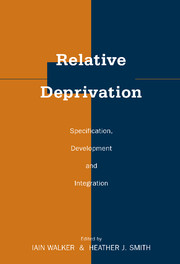16 - Summing Up: Relative Deprivation as a Key Social Psychological Concept
Published online by Cambridge University Press: 29 September 2009
Summary
Theoretical ideas arise to solve puzzles. Not surprisingly, Samuel Stouffer devised the concept of relative deprivation (RD) as a post hoc explanation for the famous anomalies from his World War II American Soldier studies (Stouffer, 1962: Chapter 2; Stouffer, Suchman, DeVinney, Star, & Williams, 1949).
Recall how the military police were more satisfied with slow promotions than the air corpsmen with rapid promotions, and how African American soldiers in southern camps were more satisfied than those in northern camps. The apparent puzzles assumed the wrong referent comparisons. Immediate comparisons, Stouffer reasoned, were the salient referents: the military police compared their promotions with other military police, and the African American soldiers in the South with African American civilians in the South.
Stouffer, my principal research mentor, did not think of himself as a theorist. His greatest achievement, together with his friend Paul Lazarsfeld of Columbia University, was the fashioning of the large probability survey into a major empirical instrument of the social sciences. He was a genius at analyzing survey data, skillfully controlling for relevant variables and making sense out of complex findings. To this day, his terse volume Communism, Conformity, and Civil Liberties (Stouffer, 1955) offers a model for precision in survey analysis. His favorite Shakespearian citation from King Henry IV has Glendower asserting that he could “call spirits from the vasty deep.” But, Hotspur retorts, “Why, so can I, or so can any man; But will they come when you do call for them?” When Stouffer called for them from survey data, the answers always came.
- Type
- Chapter
- Information
- Relative DeprivationSpecification, Development, and Integration, pp. 351 - 374Publisher: Cambridge University PressPrint publication year: 2001
- 20
- Cited by

